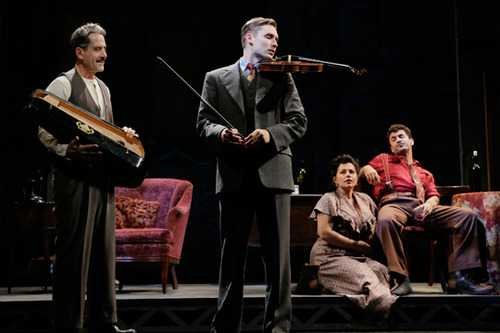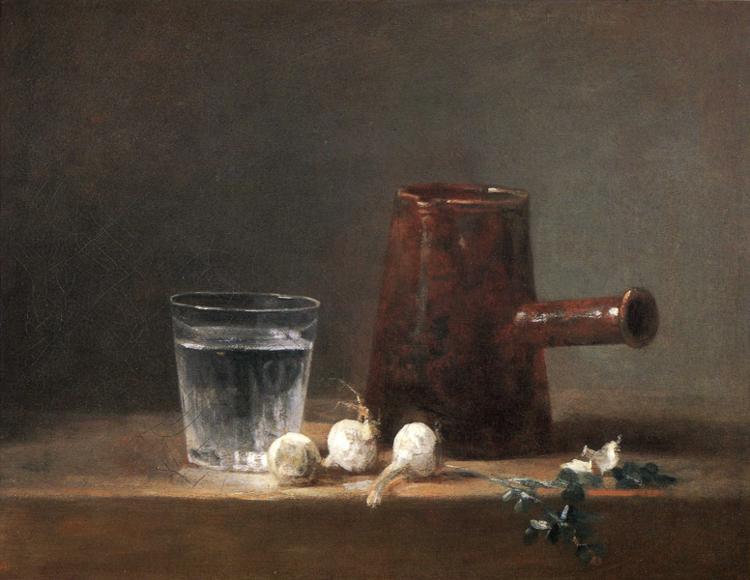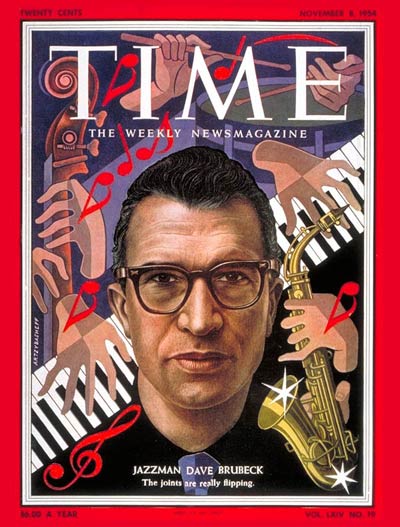“I have become convinced that movie people and politicians spring from the same DNA. They are both unpredictable, sometimes glamorous, usually in crisis (imagined or otherwise), addicted to power, anxious to please, always on stage, hooked on applause, enticed by publicity, always reading from scripts written by someone else, constantly taking the public pulse, never really certain, except publicly.”
Jack Valenti (quoted in Burton Paretti, The Leading Man: Hollywood and the Presidential Image)
Archives for 2012
TT: An American master returns to Broadway
In today’s Wall Street Journal drama column I review a rare and important Broadway revival of Clifford Odets’ Golden Boy and the premiere of David Mamet’s The Anarchist. Here’s an excerpt.
* * *
Clifford Odets didn’t make it easy on posterity. Born in 1906, he’d already written two major plays by the age of 31, and turned up on the cover of Time a year after that. Then Hollywood got its claws into him, and he spent the rest of his life knocking out good, bad and indifferent screenplays for money, trying vainly to repeat the successes of “Awake and Sing!” and “Golden Boy” when not preoccupied with studio hackwork. In time his theatrical reputation faded to black, and first-class revivals of his youthful masterpieces are now degradingly rare. Except for a 1964 musical version that starred Sammy Davis, Jr., that “Golden Boy” hasn’t been seen on Broadway since 1952. Now Lincoln Center Theater has brought it back to the Belasco Theater, where the play was first performed 75 years ago, and given it a production of the utmost splendor and compulsion. Watching it is like standing in front of a blowtorch.
 Time was when everybody knew the plot of “Golden Boy,” in part because it was later turned into the film that made 21-year-old William Holden a star. In the 1939 screen version, Holden was cast in the central role of Joe Bonaparte (now played onstage by Seth Numrich), a talented young Italian-American violinist who hates the emasculating poverty into which he was born and seeks to escape it by becoming a lightweight boxer, thereby horrifying his music-loving father (Tony Shalhoub). Joe inevitably falls among thieves, the worst of whom is a murderous gangster (Anthony Crivello) who uses the boy’s hunger for fame to set him on a path that leads away from the “truthful success” for which his father longs.
Time was when everybody knew the plot of “Golden Boy,” in part because it was later turned into the film that made 21-year-old William Holden a star. In the 1939 screen version, Holden was cast in the central role of Joe Bonaparte (now played onstage by Seth Numrich), a talented young Italian-American violinist who hates the emasculating poverty into which he was born and seeks to escape it by becoming a lightweight boxer, thereby horrifying his music-loving father (Tony Shalhoub). Joe inevitably falls among thieves, the worst of whom is a murderous gangster (Anthony Crivello) who uses the boy’s hunger for fame to set him on a path that leads away from the “truthful success” for which his father longs.
Why did it take so long for “Golden Boy” to be revived? The obvious reason is that it has 19 speaking roles and requires five sets, making it impossible to produce commercially other than at ruinous expense. Beyond that, the cornball plot, if taken at face value, is the stuff of parody. But if you instead approach “Golden Boy” as you would an opera, you’ll find that Odets knew exactly what he was doing. “Golden Boy” is a true and telling parable of American ambition, a tale in which the ordinary is made extraordinary by transposing it into an emotional key so high that you almost expect the actors to break into song….
“The Anarchist,” David Mamet’s new play, is a 70-minute-long debate between a hard-left domestic terrorist (Patti LuPone) who has spent 35 years in prison for murdering two policemen and her Grand Inquisitress, the parole officer (Debra Winger) who is resolved to keep her there until she breathes her last. On paper it’s an intellectual skirmish about the nature of political fanaticism, written in a stilted style (no four-letter words, a minimum of contractions) that sounds deliberately artificial…
While the issues at stake are sufficiently dramatic in and of themselves to make for an interesting night at the theater, Mr. Mamet, who is on record as believing that “the director is not primary in the theater” and “could, indeed, be disposed of,” has made the suicidal decision to direct “The Anarchist” himself. The flat, bald results suggest a Socratic dialogue staged in the just-the-facts-ma’am manner of an episode of “Dragnet,” only without closeups….
* * *
Read the whole thing here.
The 1939 film version of Golden Boy, starring William Holden, Adolphe Menjou, and Barbara Stanwyck and directed by Rouben Mamoulian:
TT: When a miss is as good as a mile
In today’s Wall Street Journal “Sightings” column I hold forth on the fertile topic of flawed masterpieces. Here’s an excerpt.
* * *
Donald Francis Tovey, the celebrated English musicologist, liked to pose this riddle to his students: “Q. What is it which we all wish to learn from the Great Masters, and why can we never learn it? A. How to get out of a hole. Because they never get into a hole.” I thought of his puckish words when I saw the current Off-Broadway revival of August Wilson’s “The Piano Lesson.” Mr. Wilson was one of the greatest playwrights of the 20th century, and “The Piano Lesson” is one of his best plays–even though it’s needlessly talky. Like so much of his work, it’s flawed by the garrulousness that was Mr. Wilson’s cardinal artistic sin. Yet that didn’t stop me from marveling at “The Piano Lesson,” nor does it diminish his stature. Even among the great masters, it is imperfection, not perfection, that is the normal condition of art, and the higher you aim, the more likely you are to miss….
 This difficulty is more common to large-scale narrative art than to, say, painting or poetry. The smaller the canvas, the easier it is to get everything right, as Chardin did in “Glass of Water and Coffeepot,” which hangs in Pittsburgh’s Carnegie Museum of Art. Who would dare to suggest that the artist should have altered a single brush stroke of this exquisitely wrought still life, or long to change so much as one of the 62 lapidary words of William Butler Yeats’ “The Choice”?…
This difficulty is more common to large-scale narrative art than to, say, painting or poetry. The smaller the canvas, the easier it is to get everything right, as Chardin did in “Glass of Water and Coffeepot,” which hangs in Pittsburgh’s Carnegie Museum of Art. Who would dare to suggest that the artist should have altered a single brush stroke of this exquisitely wrought still life, or long to change so much as one of the 62 lapidary words of William Butler Yeats’ “The Choice”?…
As the scale of a work of art increases, though, the artist’s control of detail diminishes, and that’s when things typically start to go wrong. I don’t know a better Western than Howard Hawks’ “Rio Bravo,” but I wouldn’t have the slightest difficulty chopping out at least 15 of its 141 minutes…
Joan Acocella recently wrote a piece for the New Yorker in which she cited several great novels with defective endings, the best known of which are “David Copperfield” and “Huckleberry Finn.” What I call “finale-itis,” however, is just as common in other lines of artistic endeavor. Duke Ellington had so chronic a case of finale-itis that he actually persuaded Billy Strayhorn, his longtime collaborator, to write the last 10 measures of “A Tone Parallel to Harlem.” (No, you can’t tell who wrote what unless you’ve been tipped off in advance.) And William Walton stalled out completely when writing his First Symphony, allowing it to be “premiered” in 1934 without a final movement, which he belatedly supplied a year later. “I had to wait for the mood–I could not think of the right thing to do,” he said. “Then it came.” Except that it didn’t: The finale of Walton’s First is a super-spectacular but windy piece of musical rhetoric that lacks the concentration of the preceding movements.
Here as elsewhere, the good news is that the imperfections of a masterpiece need not prevent us from loving it, flaws and all….
* * *
Read the whole thing here.
Semyon Bychkov and the WDR-Sinfonieorchester Köln perform the finale of William Walton’s First Symphony in concert in 2009:
TT: Almanac
“I like to do nothing, to escape from purpose: to brood, to think back and forth; to sit by a fire in Winter, or in a garden in Summer; to loaf on a sea-beach with the sun on me; to hang over the wall of a pier-head watching the waves in their green and white tantrums; to sit in a brasserie on a Parisian boulevard with a common bock, and the people moving to and fro; to idle in parks or public squares, or in the quadrangles and closes of colleges, or the Inns of Court, or the great cathedrals; to forget haste and effort in old empty churches, or drowsy taverns; to rest by a road-side hedge, or in a churchyard where sheep browse; to lie in a punt in the green shade of the willows; to sit on a fence–these things please me well.”
Holbrook Jackson, The Anatomy of Bibliomania (courtesy of Richard Zuelch)
TT: So you want to see a show?
Here’s my list of recommended Broadway, off-Broadway, and out-of-town shows, updated weekly. In all cases, I gave these shows favorable reviews (if sometimes qualifiedly so) in The Wall Street Journal when they opened. For more information, click on the title.
BROADWAY:
• Annie (musical, G, reviewed here)
• Bring It On (musical, G, closes Dec. 30, reviewed here)
• A Christmas Story (musical, G, closes Dec. 30, most performances sold out last week, reviewed here)
• Dead Accounts (serious comedy, PG-13, closes Feb. 24, most performances sold out last week, reviewed here)
• Evita (musical, PG-13, reviewed here)
• The Mystery of Edwin Drood (musical, PG-13, most performances sold out last week, extended through Mar. 10, reviewed here)
• Once (musical, G/PG-13, nearly all performances sold out last week, reviewed here)
• Who’s Afraid of Virginia Woolf? (drama, PG-13/R, reviewed here)
OFF BROADWAY:
• Avenue Q (musical, R, adult subject matter and one show-stopping scene of puppet-on-puppet sex, reviewed here)
• The Fantasticks (musical, G, suitable for children capable of enjoying a love story, reviewed here)
• The Piano Lesson (drama, PG-13, closes Dec. 30, reviewed here)
• Tribes (drama, PG-13, closes Jan. 6, reviewed here)
• Vanya and Sonia and Masha and Spike (comedy, PG-13, closes Jan. 13, reviewed here)
CLOSING NEXT WEEK OFF BROADWAY:
• Giant (musical, G/PG-13, closes Dec. 16, reviewed here)
TT: Almanac
“It’s one thing to develop a nostalgia for home while you’re boozing with Yankee writers in Martha’s Vineyard or being chased by the bulls in Pamplona. It’s something else to go home and visit with the folks in Reed’s drugstore on the square and actually listen to them. The reason you can’t go home again is not because the down-home folks are mad at you–they’re not, don’t flatter yourself, they couldn’t care less–but because once you’re in orbit and you return to Reed’s drugstore on the square, you can stand no more than fifteen minutes of the conversation before you head for the woods, head for the liquor store, or head back to Martha’s Vineyard, where at least you can put a tolerable and saving distance between you and home. Home may be where the heart is but it’s no place to spend Wednesday afternoon.”
Walker Percy, Lost In The Cosmos: The Last Self-Help Book (courtesy of Rod Dreher)
TT: Dave Brubeck, R.I.P.
 Dave Brubeck, a wonderful artist and an uncommonly kind and decent man, died today, on the eve of his ninety-second birthday. The Los Angeles Times obituary is here.
Dave Brubeck, a wonderful artist and an uncommonly kind and decent man, died today, on the eve of his ninety-second birthday. The Los Angeles Times obituary is here.
Much will be said about Brubeck in days to come, so I’ll confine myself to a purely personal note: I learned how to play jazz bass as a boy by plucking along with my father’s battered copy of Jazz Goes to College, the 1954 live album that made Brubeck a star. It’s as listenable today as it was six decades ago. So are most of his other records, this one in particular.
Here’s a rare kinescope of the Dave Brubeck Quartet performing “The Duke,” a tribute to Duke Ellington that was Brubeck’s best-known composition. Paul Desmond is the saxophonist, Bob Bates the bassist, Joe Dodge the drummer:
And here’s my all-time favorite Brubeck record, a performance of his own “Summer Song” in which he accompanies none other than Louis Armstrong. Iola, Dave’s wife, wrote the lyric:
TT: Snapshot
Clifford Brown performs “Oh, Lady Be Good” and “Memories of You” in 1955 on Soupy Sales’ Soup’s On. This clip is believed to be the only surviving performance film of Brown:
(This is the latest in a series of arts-related videos that appear in this space each Monday and Wednesday.)
